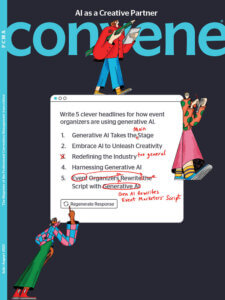
“Nine out of 10 most successful leaders in the world don’t have above-average IQ. They have above-average EQ, emotional quotient,” said Beni Gradwohl, cofounder and CEO of Cognovi Labs. (Sergio Membrillas illustration)
“The majority of decisions we make as human beings,” Beni Gradwohl told Convene, come not from the conscious mind, but the subconscious mind. “Our decisions are based on emotions,” the cofounder and CEO of Cognovi Labs said. “People think, ‘Oh no, I’m very rational.’ You’re not. In fact, decisions in the subconscious mind are made a fraction of a second before the rational mind recognizes that, ‘Oh I actually made a decision.’”

Part of our July/August cover and CMP Series. (Sergio Membrillas illustration)
Gradwohl, who earned a Ph.D. in physics, used to think that “cold, hard data defines the world.” But when he was exposed to behavioral economics, his world view changed. “Emotional intelligence is much more important than IQ,” he said. “Nine out of 10 most successful leaders in the world don’t have above-average IQ. They have above-average EQ, emotional quotient.”
He cofounded AI company Cognovi Labs, Gradwohl said, “to better understand how we humans make decisions and understand social cues, using data and science and technology to measure the underlying emotions.”
Our brains, Gradwohl said, “make up narratives. Most of them are hopefully close to the truth but many are not. That’s very similar to generative AI and ChatGPT, which is a prediction engine trying to predict what comes next. It makes up news or a narrative, which [could be] incorrect. All of a sudden, we are all up in arms — ‘Oh my gosh, generative AI makes up news. It’s fake news.’ Yet our brain does the same.”
Cognovi Labs uses AI to understand the emotional undertone in textual or transcribed data from publicly available information, including social media and discussion forums, blogs, and the deep web (where contents are not indexed by standard web search engines), as well as from such client data as surveys and call center transcripts. The company measures 10 emotions — amusement, surprise, joy, hope, trust, contempt, fear, disgust, sadness, and anger — in context through deep machine learning and then takes that a step further to see how those emotions lead to action.
Emotional AI for the Business Events Industry
When asked to consider how event organizers could benefit from using emotional AI, Gradwohl asked: “The first thing is, do you really understand how your target audience makes decisions — what’s driving them to come to an event?” You can ask them, he said, but there’s a good chance what potential registrants tell you is incorrect. “Now, if it’s a little bit incorrect, it doesn’t matter,” he added. “If they completely miss it, you will create an entire strategy based on something they told you, which is actually unimportant.”

Beni Gradwohl
That’s because registering for a conference is not an entirely rational decision — thinking they are going to an in-person event strictly for knowledge transfer, for example. What could be more at play is an audience’s desire to feel part of a professional community, to belong. And it goes even deeper than that, Gradwohl said. “Can you refine that? What is it about that belonging? Is it just friendship? Is it the topics? Understanding how your audience makes decisions is important because you don’t want to sell them something they don’t care about.” Cognovi’s AI tool uncovers “the underlying emotional drivers or blockers,” he said, “of your audience’s decision-making.”
Once you know how to evoke an underlying emotion in a call to action, the company uses another AI tool that acts like “a spell checker for emotions,” Gradwohl said, “to tell you in any communication you have: Do you evoke those emotions? And if so, what is the expected outcome you’re going to evoke. You can change that in real-time. You can even use some of the generative AI in the background to come up with additional versions of what you just wrote — just by changing some of the words so you can start building emotionally engaging marketing, emails, and communications.”
Using the example of a social-media event marketing campaign, “we take the post, we run it through analysis, and we take their key performance indicators,” Gradwohl said. “How many clicks, click-through rates, what were the likes, the shares?”
Beyond using emotional AI in the marketing leading up to an event, once the event is underway, Gradwohl said organizers can tap into how their participants are feeling. That involves using feedback surveys that don’t just ask questions with “yes” or “no” responses. “Why don’t you have a survey with real-time, free-flowing conversation in your event app?” Gradwohl asked. Have attendees “talk into it and then transcribe that. We call that diagnostic interviews because you generate a strong and a rich emotional response. It’s amazing what technology can find out. Have those conversations” about what they are experiencing, he said, throughout the program at different times of the day. “You will see what the emotional blockers are and the drivers. You get a full picture of the emotional dimensions of the audience.”
Michelle Russell is editor in chief of Convene.
